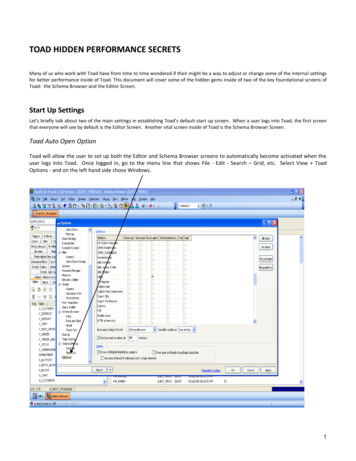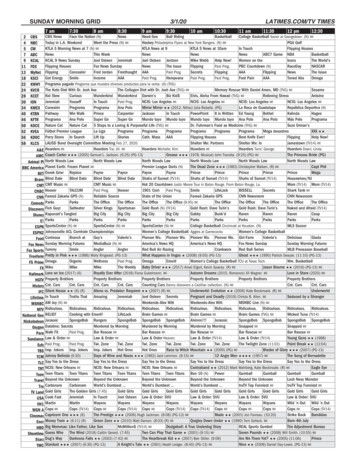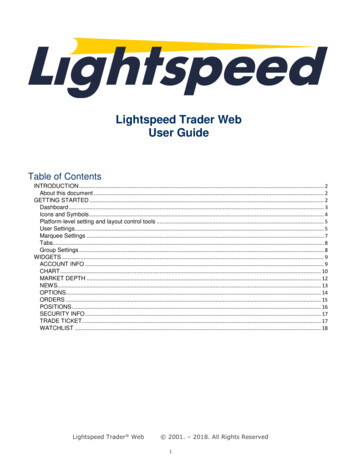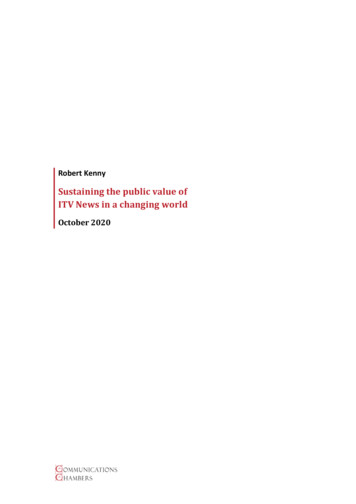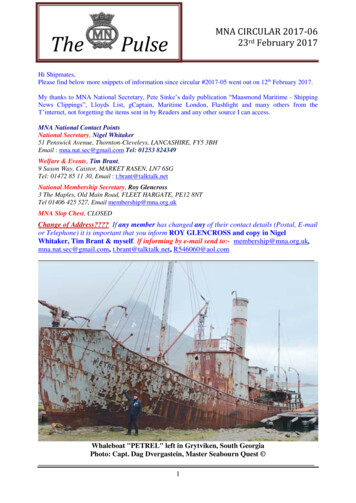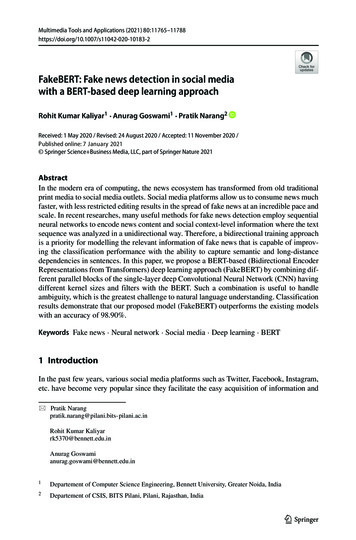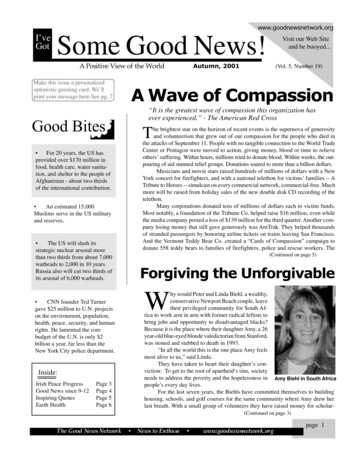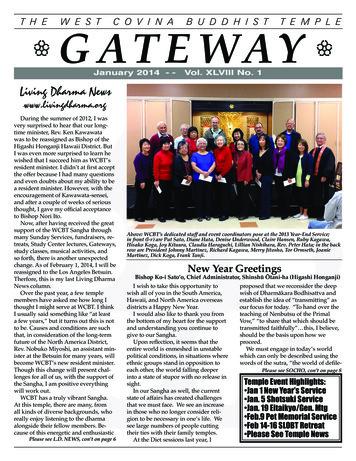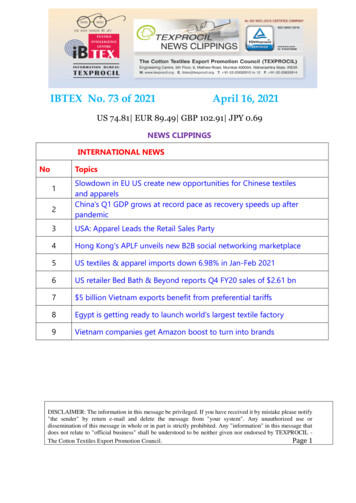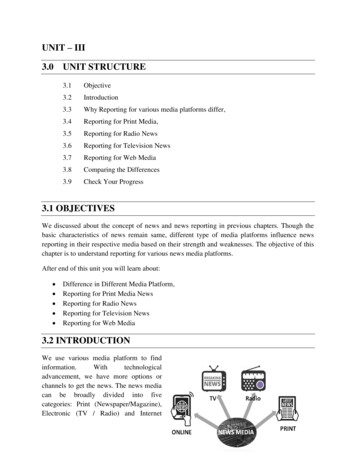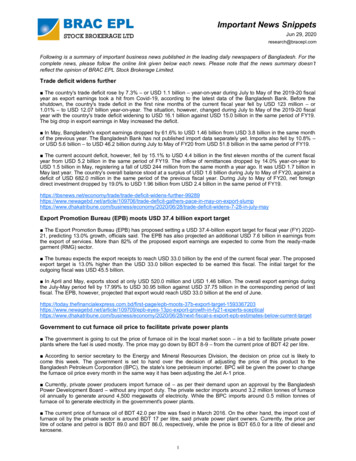
Transcription
Important News SnippetsJun 29, 2020research@bracepl.comFollowing is a summary of important business news published in the leading daily newspapers of Bangladesh. For thecomplete news, please follow the online link given below each news. Please note that the news summary doesn’treflect the opinion of BRAC EPL Stock Brokerage Limited.Trade deficit widens further The country's trade deficit rose by 7.3% – or USD 1.1 billion – year-on-year during July to May of the 2019-20 fiscalyear as export earnings took a hit from Covid-19, according to the latest data of the Bangladesh Bank. Before theshutdown, the country's trade deficit in the first nine months of the current fiscal year fell by USD 123 million – or1.01% – to USD 12.07 billion year-on-year. The situation, however, changed during July to May of the 2019-20 fiscalyear with the country's trade deficit widening to USD 16.1 billion against USD 15.0 billion in the same period of FY19.The big drop in export earnings in May increased the deficit. In May, Bangladesh's export earnings dropped by 61.6% to USD 1.46 billion from USD 3.8 billion in the same monthof the previous year. The Bangladesh Bank has not published import data separately yet. Imports also fell by 10.8% –or USD 5.6 billion – to USD 46.2 billion during July to May of FY20 from USD 51.8 billion in the same period of FY19. The current account deficit, however, fell by 15.1% to USD 4.4 billion in the first eleven months of the current fiscalyear from USD 5.2 billion in the same period of FY19. The inflow of remittances dropped by 14.0% year-on-year toUSD 1.5 billion in May, registering a fall of USD 244 million from the same month a year ago. It was USD 1.7 billion inMay last year. The country's overall balance stood at a surplus of USD 1.6 billion during July to May of FY20, against adeficit of USD 682.0 million in the same period of the previous fiscal year. During July to May of FY20, net foreigndirect investment dropped by 19.0% to USD 1.96 billion from USD 2.4 billion in the same period of ly-mayExport Promotion Bureau (EPB) moots USD 37.4 billion export target The Export Promotion Bureau (EPB) has proposed setting a USD 37.4-billion export target for fiscal year (FY) 202021, predicting 13.0% growth, officials said. The EPB has also projected an additional USD 7.6 billion in earnings fromthe export of services. More than 82% of the proposed export earnings are expected to come from the ready-madegarment (RMG) sector. The bureau expects the export receipts to reach USD 33.0 billion by the end of the current fiscal year. The proposedexport target is 13.0% higher than the USD 33.0 billion expected to be earned this fiscal. The initial target for theoutgoing fiscal was USD 45.5 billion. In April and May, exports stood at only USD 520.0 million and USD 1.46 billion. The overall export earnings duringthe July-May period fell by 17.99% to USD 30.95 billion against USD 37.75 billion in the corresponding period of lastfiscal. The EPB, however, projected that export would reach USD 33.0 billion at the end of Government to cut furnace oil price to facilitate private power plants The government is going to cut the price of furnace oil in the local market soon – in a bid to facilitate private powerplants where the fuel is used mostly. The price may go down by BDT 8-9 – from the current price of BDT 42 per litre. According to senior secretary to the Energy and Mineral Resources Division, the decision on price cut is likely tocome this week. The government is set to hand over the decision of adjusting the price of this product to theBangladesh Petroleum Corporation (BPC), the state's lone petroleum importer. BPC will be given the power to changethe furnace oil price every month in the same way it has been adjusting the Jet A-1 price. Currently, private power producers import furnace oil – as per their demand upon an approval by the BangladeshPower Development Board – without any import duty. The private sector imports around 3.2 million tonnes of furnaceoil annually to generate around 4,500 megawatts of electricity. While the BPC imports around 0.5 million tonnes offurnace oil to generate electricity in the government's power plants. The current price of furnace oil of BDT 42.0 per litre was fixed in March 2016. On the other hand, the import cost offurnace oil by the private sector is around BDT 17 per litre, said private power plant owners. Currently, the price perlitre of octane and petrol is BDT 89.0 and BDT 86.0, respectively, while the price is BDT 65.0 for a litre of diesel andkerosene.1
Important News SnippetsJun 29, private-power-plants-99256For NBFIs, 2019 was a terrible year. And 2020 is poised to be even worse The year 2019, it seems, was an annus horribilis for the non-bank financial institutions industry. Not only did it see thefall of an institution, a development that not only undercut the confidence in the sector, the year also the industry'sdefault loans soar 17.2% to BDT 64.0 billion in 2019. The amount would have been much larger had the default loansof the fallen People's Leasing and Financial Services (PLFS), which were between BDT 6.0 billion to BDT 7.0 billion,were added to the list, said a central bank official. The situation in the NBFI sector is yet to improve. In fact, some of them have plunged into deep trouble due to theongoing economic fallout brought on by the coronavirus pandemic. The NBFI sector started facing problems since themiddle of 2018 when the banking sector felt the pinch of liquidity crunch, said Arif Khan, managing director of IDLCFinance, one of the big names in the sector. Earlier in January 2018, to rein in aggressive lending, the BB had instructed conventional banks and Shariah-basedbanks to lower their loan-deposit ratios to 83.5% and 89.0% respectively, a move which had a domino effect on theNBFI sector. The ratio of defaulted loans in the NBFI sector stood at 9.5% of the total disbursed loans amounting toBDT 671.8 billion as of December last -worse-1922033Cap on company promotional expenses to be relaxed The ceiling imposed on companies' promotional expenses may be increased as the proposed new budget may gothrough some changes before it is passed today. Withdrawal of additional supplementary duty on mobile phoneservices and scrap of the time limit for claiming VAT rebates on raw materials are among few other amendmentsrevenue officials are expecting. An NBR official involved with the budget said they had received a lot of amendment proposals from economists andbusinessmen. They have also received 51 amendment proposals from the discussions of lawmakers since the budgetwas placed in parliament on June 11. However, given the revenue collection target, they are not accepting more than10-12. The government will implement the fiscal policy for the fiscal year 2020-21, beginning on July 1, by passing thebudget on Monday (today). Although the companies' promotional expenses were tied to 0.5% of a company's turnover in the proposed budget,the government is also moving from it, and the limit may be set at 1.0%, according to sources. Traders fear that if thepromotional expenditure is limited to 0.5%, pharmaceutical, IT, multinational and new companies will face a huge ompany-promotional-expenses-go-99316Janata Jute Mills changes hand in BDT 7.0 billion deal The Bangladeshi private sector has witnessed its biggest ever silent acquisition in the country during the Covid-19pandemic. Akij Group Managing Director Sk Bashir Uddin has bought Janata Jute Mills – one of the largest, oldest andmost-profitable jute product makers in the country – for around BDT 7.0 billion. The deal also includes Sadat Jute Mills,a second factory owned by Janata – that was established in 1985 in Cumilla – and a cold storage facility. According to Mahmudul Huq, the erstwhile deputy managing director of Janata Jute Mills, there was nothing wrongwith our mills and they were making profits and had no bank loans. He also added that their export value in 2019 wasaround USD 55 million (over BDT 4.5 billion) Acquisitions are very rare in Bangladesh. In most cases foreign companies buy either local or other foreign entitiesoperating in the country. The most recent, and biggest ever, acquisition also involved Akij Group when it sold its entiretobacco business to Japan Tobacco at a whopping USD 1.5 billion (equivalent to BDT 124.0 billion) in November 2018.In April the same year, Alipay – an affiliate of Alibaba Group – bought 20.0% stakes in bKash. A Chinese consortium,that includes the Shenzhen and Shanghai stock exchanges, bought 25.0% stakes in the Dhaka Stock Exchange forUSD 125 million (around BDT 10.0 billion) in 2018. In the same year, Beximco Pharmaceuticals Limited completed theacquisition of 85.2% of Nuvista Pharma mills-changes-hand-BDT 700cr-deal-99301Bharti Airtel buys out NTT DoCoMo's stake in Robi Bharti International (Singapore) Pte Ltd, a wholly owned arm of Bharti Airtel, has acquired Japanese telco, NTTDoCoMo's 6.3% stake in Robi Axiata for an undisclosed sum in an all-cash deal, increasing its stake in Bangladesh's2
Important News SnippetsJun 29, 2020research@bracepl.comsecond-largest mobile carrier to 31.3%. The deal was announced after market hours. Airtel shares had closed 2.93 % lower at Rs 567.60 on BSE Tuesday.Airtel declined to share the deal size. Robi Axiata is a subsidiary of Axiata Investments (Labuan) Ltd, which, in turn, is aunit of Malaysian telecom carrier, Axiata Group Berhad. Axiata has a controlling 68.7% stake in the -robi-1593368465Bangladesh Securities and Exchange Commission (BSEC) to inspect brokerage house regularly After about a year and a half, the Bangladesh Securities and Exchange Commission (BSEC) has decided to startroutine inspections of brokerage houses. For this, the organisation will form three 3-member committees composed ofofficials from the stock exchanges and the BSEC. The decision was taken on Sunday at an emergency meeting of thecommission that was held to discuss about paying back the shares and money of Crest Securities Ltd to its clients. There are two types of inspection procedures in these institutions for compliance supervision. The first is to inspect abrokerage house or stock dealer or merchant bank based on specific allegations, known as special inspection. Theother is the inspection of any merchant bank, brokerage house and stock dealer by the commission without anycomplaint. According to the BSEC's annual report, 15 regular inspections of listed merchant banks and brokerage houses havebeen completed in the 2015-16 financial year, 37 institutions in 2016-17 financial year, and 19 institutions in 2017-18financial year. Of these, only five institutions were regularly inspected in t-brokerage-house-regularly-99304Bourse braces for its biggest IPO yet Robi is set to come up with the country's biggest-ever initial public offering yet within a couple of months, in what canbe viewed as finally some good news for the depressed bourse. The second-largest mobile phone carrier intends toraise BDT 5.2 billion from the market. The Bangladesh Securities and Exchange Commission (BSEC) has almostcompleted the scrutiny of the floatation proposal and is planning to approve the listing proposal within the next coupleof months. Some 10%, or about 523.8 million, shares would be offloaded, according to the application, which wassubmitted on March 2. The face-value will be BDT 10.0 and there will be no premium. According to the chief executive officer of Asian Tiger Capital Partners, Robi is coming at a face-value. This is a goodsign and it will impact the stock market positively. Investors may come to the market to buy the stocks which we sawwhen Grameenphone went public. Robi, a sister concern of Axiata Group of Malaysia and a multinational venture, isvery compliant and the market has not seen the entry of such a good company in the last eight to 10 years. Investors would get the share at BDT 10.0 that has the assets of BDT 12.64, he said, adding that the share pricecompared to earnings before interest, tax, depreciation and amortisation (EBITDA) is very lucrative. The price oftelecom shares normally ranges between 6 and 8% of EBITDA globally, but it is 3.4% in case of Robi, he e files petition challenging SMP restrictions Grameenphone filed a writ petition before a High Court bench yesterday challenging a June 21 directive ofBangladesh Telecommunication Regulatory Commission (BTRC) alongside two restrictions imposed under significantmarket power (SMP) guidelines. This is the third time the leading mobile network operator has legally challengeddifferent points of the SMP guidelines. Court orders in the first two went in its favour. According to the restrictions, scheduled to be implemented from July 1, Grameenphone would have to secure priorapproval from the telecom regulator before rolling out any package or offer. It will also have to have all of its existingpackages and offers validated by August 31. Conditions of the approved packages or offers cannot be changed oramended without the watchdog's consent. The BTRC also made it easier for subscribers to leave Grameenphoneunder mobile number portability (MNP) facility. According to the SMP guideline, the regulator can declare a carrier an SMP operator if it controls more than 40.0%share of any parameter. Grameenphone holds 45.6% share of the subscriber base and more than 50.0% share of therevenue generated. The number of active subscribers at Grameenphone stood at 76.5 million, earning the carrier BDT143.7 billion at the end of 2019. It logged a record BDT 34.5 billion profit last year, the highest to lines-1922025Unilever acquires 82.0% stake of GSK Bangladesh3
Important News SnippetsJun 29, 2020research@bracepl.com Unilever Overseas Holdings BV has become the new owner of GlaxoSmithKline (GSK) Bangladesh Ltd bycompleting the acquisition of 82.0% shares in the pharmaceutical giant. According to the Dhaka Stock Exchange(DSE), Unilever bought 9.875 million shares from Setfirst Ltd, a sister concern of GSK, through the block market onSunday. Unilever bought each share of GSK at BDT 2,046.3 and the total value of the transaction stood at BDT 20.2 billion,which is the highest trade value of an individual company in the history of DSE. Therefore, owing to this blocktransaction, the daily turnover at the premiere bourse amounted to BDT 25.4 billion — the highest in the last nineyears. On the main trading floor at the DSE, the share price of GSK surged by 3.11% to BDT 2,110 per share onSunday, which was BDT 2,046 per share in the previous session. The closing price of the company stood at BDT2,084.1 per share. After shutting down the pharmaceuticals business, GSK made a profit of BDT 9.9 million in the last financial year. Italso recommended a 530% cash dividend to its shareholders. At present, Horlicks contributes to around 93.0% ofGSK Bangladesh's annual sales. The rest comes from mainly Sensodyne toothpaste, though there are some minorproducts like over the counter antacid brand -bangladesh-for-BDT -2020crWorld Stock and Commodities*Index NameCrude Oil (WTI)*Crude Oil (Brent)*Gold Spot*DSEXS&P 500FTSE 100BSE SENSEXKSE-100CSEALLClose ValueValue Change% Change YTDUSD 37.76USD 40.25USD 5,145.55(USD 23.87)(USD 28.19)USD 7.25%-16.05%Exchange RatesUSD 1 BDT 84.83*GBP 1 BDT 104.86*EUR 1 BDT 95.31*INR 1 BDT 1.12**Currencies are taken from XE Currency Converter and Commodities are taken from Bloomberg.4
Important News SnippetsJun 29, 2020research@bracepl.comIMPORTANT DISCLOSURESAnalyst Certification: Each research analyst and research associate who authored this document and whosename appears herein certifies that the recommendations and opinions expressed in the research reportaccurately reflect their personal views about any and all of the securities or issuers discussed therein that arewithin the coverage universe.Disclaimer: Estimates and projections herein are our own and are based on assumptions that we believe to bereasonable. Information presented herein, while obtained from sources we believe to be reliable, is notguaranteed either as to accuracy or completeness. Neither the information nor any opinion expressed hereinconstitutes a solicitation of the purchase or sale of any security. As it acts for public companies from time to time,BRAC-EPL may have a relationship with the above mentioned company(s). This report is intended for distributionin only those jurisdictions in which BRAC-EPL is registered and any distribution outside those jurisdictions isstrictly prohibited.Compensation of Analysts: The compensation of research analysts is intended to reflect the value of theservices they provide to the clients of BRAC-EPL. As with most other employees, the compensation of researchanalysts is impacted by the overall profitability of the firm, which may include revenues from corporate financeactivities of the firm's Corporate Finance department. However, Research analysts' compensation is not directlyrelated to specific corporate finance transaction.General Risk Factors: BRAC-EPL will conduct a comprehensive risk assessment for each company undercoverage at the time of initiating research coverage and also revisit this assessment when subsequent updatereports are published or material company events occur. Following are some general risks that can impact futureoperational and financial performance: (1) Industry fundamentals with respect to customer demand or product /service pricing could change expected revenues and earnings; (2) Issues relating to major competitors or marketshares or new product expectations could change investor attitudes; (3) Unforeseen developments with respectto the management, financial condition or accounting policies alter the prospective valuation; or (4) Interest rates,currency or major segments of the economy could alter investor confidence and investment prospects.BRAC EPL Stock Brokerage LimitedResearchAyaz Mahmud, CFASadman SakibMd. Rafiqul IslamMd. Mahirul QuddusHead of ResearchResearch AssociateResearch AssociateResearch cepl.com01708 805 22101730 727 93901708 805 22901709 636 546International Trade and SalesAhsanur Rahman BappiHead of International Trade& SalesB
Important News Snippets Jun 29, 2020 research@bracepl.com 1 Trade deficit widens further The country's
